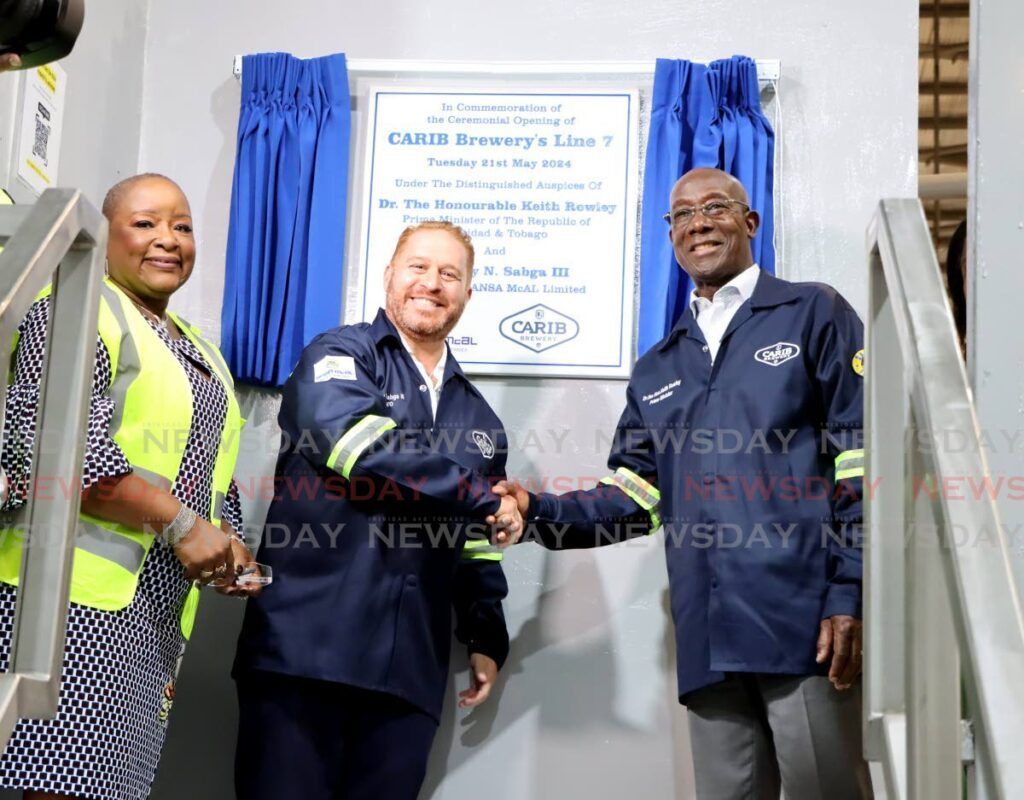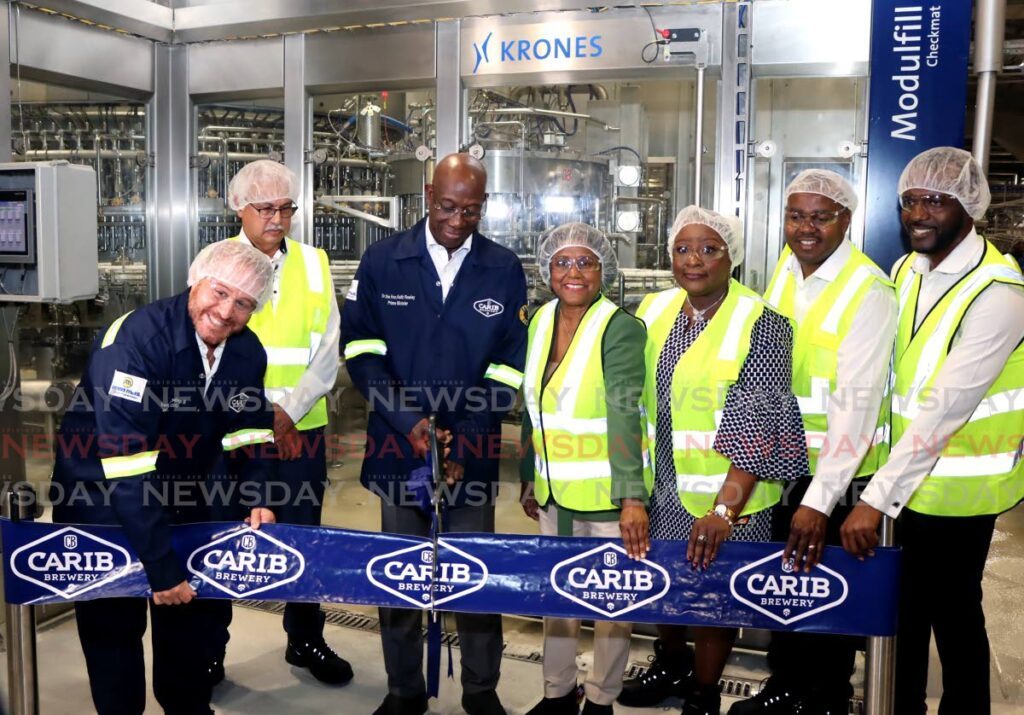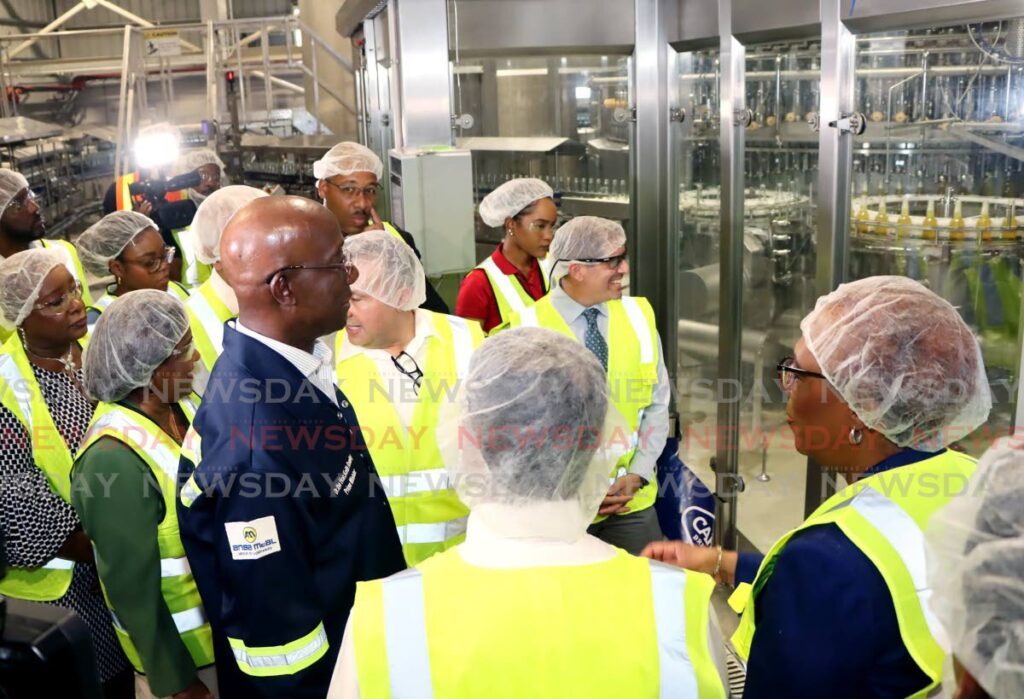Smart manufacturing line 7: Carib's $200m investment

Carib Brewery has unveiled its new $200 million smart manufacturing Line 7, commissioned by the Caribbean Development Company (CDC), making it the company’s largest investment in decades.
The new line will cater to the local market and assist in meeting export demands, adding to the company’s two other production lines.
The Prime Minister, who was the keynote speaker at the brewery’s ribbon-cutting ceremony at its Eastern Main Road, Champ Fleurs headquarters, described the production cost as a “significant injection,” which shows the company’s “unwavering commitment to environmental stewardship.”
Dr Rowley urged manufacturers to see the value in taking calculated risks, saying risk is an integral part of business strategy that can unlock new opportunities and achieve sustainable growth.
Rowley, who was in high spirits, said the new production line adopts the latest trends in innovation and technology, particularly in the context of smart factories and he believes it will meaningfully enhance the capabilities of the brewery in achieving world-class quality through process improvement.
“Smart factories are one of the cornerstones of industry, and this move is highly applauded.”

The PM described the government’s mood as “heartened" by this transformation, which he said is taking place with large conglomerates and small and medium-sized enterprises.
“We see innovation at our very own Moruga Agro-Processing and Light Industrial Park with the implementation of vertical farming and controlled environment agriculture by iFarmsTT, which offers premium-quality, pesticide- and herbicide-free, fresh greens and herbs.”
Rowley cited Novo and Charlo Farm as innovators in dehydrated culinary product lines. He also spoke about Marilissa Farms, an agro-processing business based in the south, saying it is a business that has taken calculated risks and has now successfully penetrated the milk market, producing pasteurised goat milk.
Rowley reiterated the importance of innovation and technology throughout his speech, calling it the “currency for success” and saying it remains at the core of manufacturing competitive advantage, increased productivity, economic progress and the future sustainability of the domestic economy.
He called Line 7 a state-of-the-art facility that will fortify the regional value chain for beverages in the Caribbean and open up the potential for new linkages with beverage producers around the world.
“The development of both backward and forward linkages will not only strengthen the plant’s supply chain but also contribute to the growth of related industries in the Caricom region.”
He said the government’s focus is on diversification both within and outside of the energy sector and the government views the non-energy manufacturing sector as a strong and viable driver for economic growth.
“During fiscal 2023, 40 major reinvestments by manufacturers were recorded in the amount of $1.4 billion, which is quite significant, and these projects are expected to generate at least 1,000 jobs.”
He believes in order to sustain growth and performance in the non-energy sector, there must be investment by both the public and private sectors.
“The private sector's investment of time and resources to support continued innovation, growth and expansion, complemented by public sector investment and targeted programmes and initiatives, will create the strategic partnership necessary for continued progress.”
Due to the country’s population size, the only way to achieve continued growth is to export to extra-regional markets, Rowley said.
He added that the government has been “doing its part” to create strategic partnerships, which are already “bearing fruit” for the private sector.
Rowley said the Ministry of Trade and Industry, through the Export Booster Initiative, has already funded 24 trade missions and cited his March visit to Ghana, where he said he has seen over two dozen businesses looking for opportunities, including the CDC.

“I understand that discussions with the CDC are already far advanced in respect of securing purchase orders and finalising distribution arrangements.”
The PM said the government is doing its part to grow and support the manufacturing sector and spoke about the recently opened 144-acre Phoenix Park Industrial Estate and the Dow Village Industrial Park, which is 147 acres adjacent to the Phoenix Estate and comprises.
He said these developments will help meet increased demand by investors for additional space to grow and expand their operations in light manufacturing, logistics, distribution and related business services.
Rowley also mentioned the Factory Road Industrial Park development, which is slated to open in August 2024, calling it a major regional distribution centre at Carib’s compound in Champs Fleur.
With an initial investment of more than $197 million, the park officially opened in January 2024.
He said Carib’s drive, coupled with TT opportunities, has allowed the company to grow and prosper, and he said the government remains “committed” to supporting the advancement of the manufacturing sector.
The PM ended by saying historically and culturally, the number seven has a definite mystique that is attributed to luck and success. He believes the commissioning of the new packaging line is a significant achievement in the industrial landscape, calling it a pivotal moment for sustainable development, technological advancement and economic prosperity.
Ansa McAl Group CEO Anthony N Sabga III lamented the PM's last visit in 2016, when the company launched its $200 million container-producing furnace. He said since then the CDC group has made investments over a billion dollars in capital expenditure within its beverage business, beaming as he spoke about the company’s “state of the art line 7.”
Sabga III praised bottle washers and consumers who, he said, support the returnable bottle system in other regional breweries and brew houses.
He spoke about the company’s Florida Beer, Florida and Bahamian Beverage and Brewery Co Ltd acquisitions.
He also discussed the company's brewing contract with manufacturers in Canada and Greece and its recent partnership with Globus to enter the Indian market.
“The Carib brand exists not just in the Caribbean but in the world.”
He called the $200 million production line an investment that will maintain the company’s space in the global market.
He said the group has also commenced a 50 per cent expansion of its plant business, which will be completed throughout 2024 to ensure it can fully service its regional market.
Sabga III said “no man is an island’ and believes now more than ever a collaborative approach between government and private sector is needed to keep the country and region on the path towards a sustainable future.
“Sustainability is good business in the era of renewable energy. Our group has invested $56 million to increase energy output on our joint ventures over farms in the Dominican Republic as we continue to search for promotional, viable reinvention projects in the Caribbean region.”
“What we've been doing is investing significant resources in gathering the necessary data to establish our baseline performance so that we can benchmark ourselves against these oncoming international standards.”
Sabga III said the company "took a deep, hard look at who we are and where we stand in our delivery of a sustainable world and this aligned with our vision and our core values.”
Carib Brewery's managing director, international and business development, Adrian Sabga, spoke with the media after the event and said the new production line has AI capabilities with the highest level of “brewing technology available today.
“This line is the best available right now in the market. You won't find a line of this capability and capacity available in any of the other international brewers.”
Sabga said the technology ensures beverage quality is maintained.
“It ensures the liquid coming out is of the best quality for our consumers to consume.”
He called line 7 efficient at reducing waste while cutting production time without sacrificing quality.
“The company benefits from a reduced cost per case, high efficiencies and less waste output.”
Asked about the Ghanaian market, he said the Carib sent managers to Ghana to explore the market possibilities, describing their feedback as “very fruitful.”
“It takes a lot of time to ship from Trinidad to Ghana. The company is looking at local manufacturing opportunities. We're in conversations with quite a few partners over there to explore opportunities for not only Carib but other brands.”
He anticipates the company will be making inroads in the country's market within the next six to nine months.
“Local manufacturing takes a significantly longer time to get off the floor as we have to go through an extremely rigorous process.”
He said the company is in the process of onboarding its minority interest partner in the Bahamas.
Sabga announced the company will be launching locally manufactured products in the Bahamas next month. He said that process took about seven months.
“We wanted to get the formula right for the market.”
The company has no plans at this time to set up a production plant in Ghana but is moving towards “utilising partner capacity and capabilities" there.
“If we're met with significant volume and a huge opportunity, it's definitely something we would invest in, in the future.”
He spoke about Carib’s current production within the Indian market. He said the company is utilising contract manufacturing. Sabga said accredited brewers will be sent to India to work with their local chemists to ensure they get the exact metrics.
He hinted at a potentially new beverage but remained tight-lipped, adding the company does not only produce alcoholic beverages.
“Our innovation pipeline has only just begun.”
He said the company is in 38 countries globally and has ambitions to get into 45 within the next three years.
“We're looking at more European countries.”
Describing the company's international ambition as unwavering.
“No matter which country you're in, you should be able to enjoy one of our beers.”
He estimates the company sells upwards of 15 million cases of beer per year regionally.
Sabga said the company's biggest challenge is securing forex.
“That's the biggest risk to our business right now. Part of investing in international markets is being able to secure foreign exchange so we can buy materials we don't have locally.”
Outside of the Caribbean, the company's biggest market is India, describing the country's market as massive, highly competitive, dynamic and fast-evolving.


Comments
"Smart manufacturing line 7: Carib’s $200m investment"